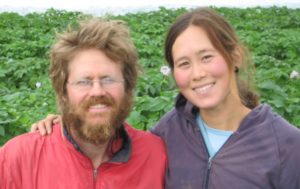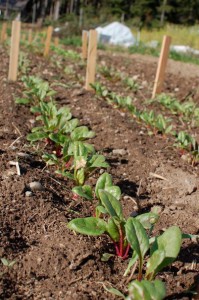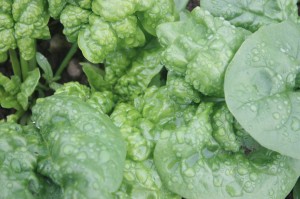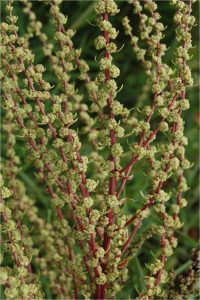
Midori Farm
Marko Colby and Hanako Myers
Port Townsend, Washington
When Marko and Hanako started Midori Farm, both had a strong interest in seed. They understood well the importance of having seed that is adapted to their region and growing conditions, and early on integrated seed production into their farm and business plan.
“We needed consistent access to varieties that are economically important to our operation,” Marko says.
Marko is especially interested in the open-source seed movement, and says that as a farmer, he’d like to become less dependent on large firms that have consolidated the market and aren’t interested in delivering seed that is appropriate for organic production systems.

But Marko also acknowledges that seed industry trends are not all doom and gloom. He says the increased interest in organic seed over the years, and the development of regional seed companies, has provided his farm an economic opportunity to grow seed commercially.
“The seed industry is centralizing on a macro scale, and at the same time, and perhaps in reaction to this trend, now sprouting more small, farm-based regional seed companies,” Marko explains. “There is more interest in organic seed and more and more farmers growing seed.”
Marko and Hanako are part of this growing movement of seed stewards who are empowered to save, produce, or improve varieties on their farm. The goals are numerous: add economic value to the farm, conserve crop genetics, and develop genetics that perform better for specific regions, climates, and markets.
“On the most basic level, the plants inspired us,” Marko says. “They have the most incredible will to live and reproduce.”
Marko and Hanako were also inspired to get involved in seed as a response to genetically engineered organisms. It was around this time that they were introduced to Organic Seed Alliance. “All the dedicated staff at OSA were tremendously inspirational,” Marko says.
They decided to partner with OSA to learn more about plant breeding. The fact that they farm in OSA’s hometown made it easy.

Marko and Hanako have been active in OSA’s participatory plant breeding work for six years. They are currently working with OSA to improve a number of crops, including OSA’s ‘Abundant Bloomsdale’ spinach, this year conducting progeny selection (choosing breeding stock based on performance). They are also helping OSA develop a new variety of purple sprouting broccoli, a project funded by Organically Grown Company that aims to improve cold-tolerance, bud size, and uniformity.
In addition to other side projects with OSA, such as red chard, Midori Farm has conducted NOVIC field trials for the last two years. These trials are essential to collecting useful data for farmers and researchers on the performance of new varieties being bred for organic systems in the northern tier of the U.S.
Aside from OSA projects, Marko and Hanako save seed from other crops for on-farm use and small-scale breeding projects, including carrots, mustards, and onions. They also produce seed commercially for regional companies.
Marko says they are most interested in improving varieties for on-farm use that can eventually be shared with the larger organic community. He’s especially excited about breeding new varieties of chicories – also an OSA participatory plant breeding project – because they’re hardy, tasty, medicinal, and easy to grow. In fact, Midori Farm hosted a field day this summer to show interested farmers, researchers, and graduate students the progress they’re making in these and other crops. This field day was made possible thanks to Seed Matters as part of our Farmer Seed Stewardship Initiative, as was just one of many educational workshops that Midori Farm has hosted for OSA.

Marko says the most exciting part of partnering with OSA on plant breeding projects is the empowerment that comes from knowing they can improve varieties that work better in their region and organic systems.
“OSA has always been happy to work with us and share everything they know,” he says. “The work OSA does is crucial because they’re educating farmers on how to regain control of their seed supply, which leads to a more resilient food system. And OSA is helping to create an organic seed system that will better serve the interests of organic growers.”
This post is part of our Farmer Seed Stewardship initiative series. The initiative is a partnership between OSA and Seed Matters, and promotes farmers engagement in seed systems – training farmers in seed production and crop improvement, and advocating for farmers’ ability to save, improve, and plant the seed they need.
